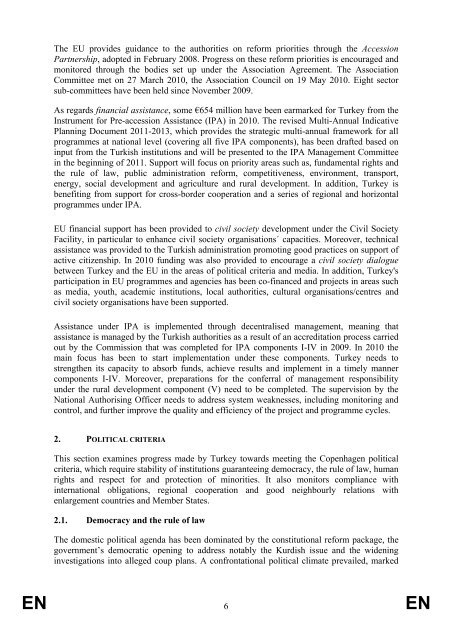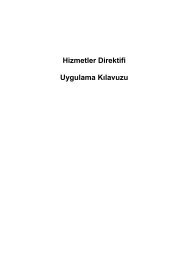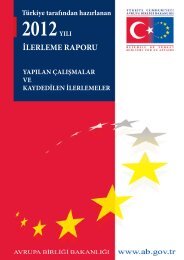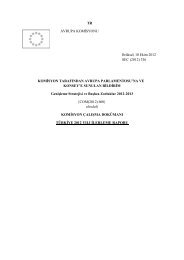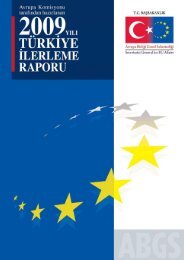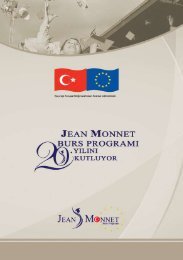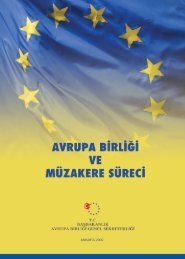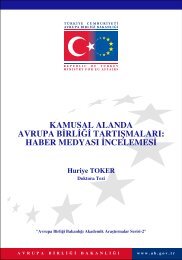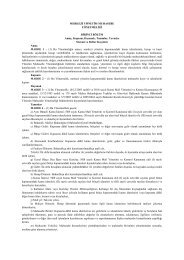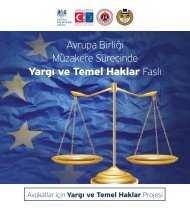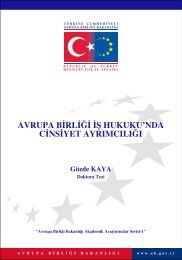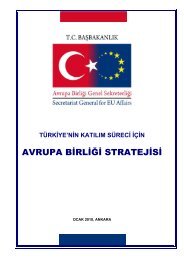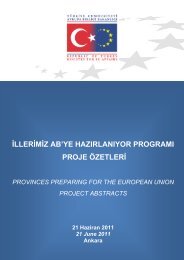2010 ilerleme raporu - Avrupa Birliği Bakanlığı
2010 ilerleme raporu - Avrupa Birliği Bakanlığı
2010 ilerleme raporu - Avrupa Birliği Bakanlığı
You also want an ePaper? Increase the reach of your titles
YUMPU automatically turns print PDFs into web optimized ePapers that Google loves.
The EU provides guidance to the authorities on reform priorities through the AccessionPartnership, adopted in February 2008. Progress on these reform priorities is encouraged andmonitored through the bodies set up under the Association Agreement. The AssociationCommittee met on 27 March <strong>2010</strong>, the Association Council on 19 May <strong>2010</strong>. Eight sectorsub-committees have been held since November 2009.As regards financial assistance, some €654 million have been earmarked for Turkey from theInstrument for Pre-accession Assistance (IPA) in <strong>2010</strong>. The revised Multi-Annual IndicativePlanning Document 2011-2013, which provides the strategic multi-annual framework for allprogrammes at national level (covering all five IPA components), has been drafted based oninput from the Turkish institutions and will be presented to the IPA Management Committeein the beginning of 2011. Support will focus on priority areas such as, fundamental rights andthe rule of law, public administration reform, competitiveness, environment, transport,energy, social development and agriculture and rural development. In addition, Turkey isbenefiting from support for cross-border cooperation and a series of regional and horizontalprogrammes under IPA.EU financial support has been provided to civil society development under the Civil SocietyFacility, in particular to enhance civil society organisations´ capacities. Moreover, technicalassistance was provided to the Turkish administration promoting good practices on support ofactive citizenship. In <strong>2010</strong> funding was also provided to encourage a civil society dialoguebetween Turkey and the EU in the areas of political criteria and media. In addition, Turkey'sparticipation in EU programmes and agencies has been co-financed and projects in areas suchas media, youth, academic institutions, local authorities, cultural organisations/centres andcivil society organisations have been supported.Assistance under IPA is implemented through decentralised management, meaning thatassistance is managed by the Turkish authorities as a result of an accreditation process carriedout by the Commission that was completed for IPA components I-IV in 2009. In <strong>2010</strong> themain focus has been to start implementation under these components. Turkey needs tostrengthen its capacity to absorb funds, achieve results and implement in a timely mannercomponents I-IV. Moreover, preparations for the conferral of management responsibilityunder the rural development component (V) need to be completed. The supervision by theNational Authorising Officer needs to address system weaknesses, including monitoring andcontrol, and further improve the quality and efficiency of the project and programme cycles.2. POLITICAL CRITERIAThis section examines progress made by Turkey towards meeting the Copenhagen politicalcriteria, which require stability of institutions guaranteeing democracy, the rule of law, humanrights and respect for and protection of minorities. It also monitors compliance withinternational obligations, regional cooperation and good neighbourly relations withenlargement countries and Member States.2.1. Democracy and the rule of lawThe domestic political agenda has been dominated by the constitutional reform package, thegovernment’s democratic opening to address notably the Kurdish issue and the wideninginvestigations into alleged coup plans. A confrontational political climate prevailed, markedEN 6 EN


